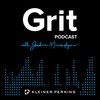

Grit
Kleiner Perkins
Grit explores what it takes to create, build, and scale world-class organizations. It features weekly episodes highlighting the leaders who are pushing their companies to make a difference. This series is hosted by Joubin Mirzadegan, go to market operating partner at Kleiner Perkins, a venture capital firm investing in history-making founders.
Episodes
Mentioned books
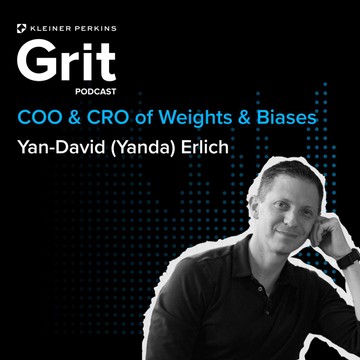
13 snips
Aug 28, 2023 • 1h 12min
#153 COO & CRO Weights & Biases, Yan-David Erlich: ML’s Moment
Yan-David Erlich, COO and CRO of Weights & Biases, discusses his decision to leave venture investing and join the AI industry. Topics include Snowflake vs. Amazon, Slack vs. Microsoft Teams, regret minimization, leaving LinkedIn, the failure of Happiness Engines, and the growth of Weights & Biases.
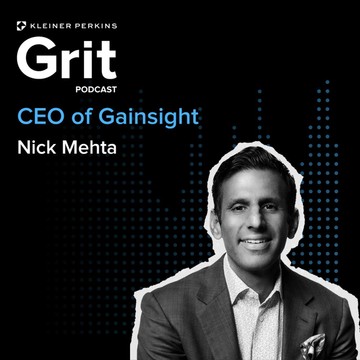
23 snips
Aug 21, 2023 • 1h 12min
#152 CEO Gainsight, Nick Mehta: Human-First
Nick Mehta, CEO of Gainsight, talks about his personal growth journey, including therapy and exploring religion. He discusses the mystique of Sand Hill Road, un-measurable marketing, and his experience with venture capitalists. The episode covers the importance of genuine values in companies, the immigrant mindset, and building a human-first company culture. Mehta also reflects on selling his previous company and analyzing CEOs' time with CODA.
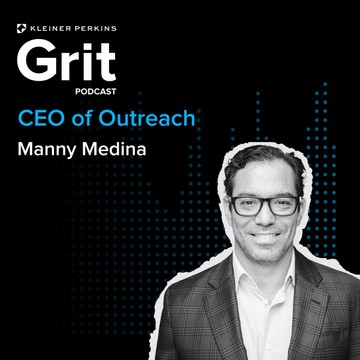
13 snips
Aug 14, 2023 • 1h 7min
#151 CEO Outreach, Manny Medina: 10M or Die
Guest: Manny Medina, CEO of OutreachIn its Seattle headquarters, the sales execution platform Outreach has at least one wall covered in AI diagrams and architectural flows. CEO Manny Medina says that’s because he believes “there’s no world in which reps don’t have an assistant the way that coders do.” The AI revolution has also given Manny — who got his M.A. in computer science at Penn — a chance to be more hands-on than your average CEO of a $4 billion company. “I try not to think myself as a CEO,” he says. “I try to think myself as a team member that is doing something useful.”In this episode, Manny and Joubin discuss northern New Jersey, American opportunity, going to the future, crossing the chasm, jujitsu, Tony Robbins, winning on your own terms, shifting motivations, inspiration through transparency, Moonwalking with Einstein, Lululemon, hands-on CEOs, and “been there, done that.”In this episode, we cover:Leaving Ecuador for the US (02:21)Would Manny do it all again? (07:45)Finding product-market fit (10:09) Scaling, scarcity, and stability (14:41)AI-assisted sales reps (18:59)Winner takes most (24:20)Placing long-term bets (26:42)Imposter syndrome and chips on your shoulder (32:59)“Ten million or die” (35:15)Irrational forces (42:33)Manny’s weekly internal emails (44:17)Memorizing names and making sacrifices (48:00)Personal and professional goals (52:23)“All the other jobs were taken” (56:53)Do-overs (01:00:18)Bad and good startup advice (01:03:24)Who Outreach is hiring and what “grit” means to Manny (01:05:58)Links:Connect with MannyLinkedInConnect with JoubinTwitterLinkedInEmail: grit@kleinerperkins.com Learn more about Kleiner PerkinsThis episode was edited by Eric Johnson from LightningPod.fm
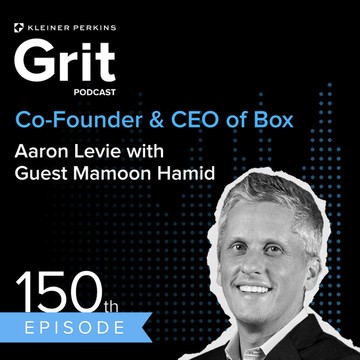
14 snips
Aug 7, 2023 • 1h 3min
#150 CEO Box, Aaron Levie w/ Mamoon Hamid: Open For Business
Guest: Aaron Levie, CEO of Box, and Mamoon Hamid, partner at Kleiner PerkinsWhen he was a newly minted venture capitalist at USVP, Mamoon Hamid got a tip that he should meet a young entrepreneur named Aaron Levie, and fought for the right to invest in his cloud storage startup, Box. For years after that initial investment, the two men say, Box’s fate was precarious: “We could have died any day,” Mamoon says, and Aaron recalled several times he had to be talked “down from a ledge.” Today, they tell us how Box established itself as “open for business” — a concept Mamoon hounded Aaron with in the early years — and grew into success.In this episode, Aaron, Mamoon, and Joubin discuss Box socks, authenticity at work, Josh Stein, living in the office, over-diligence, Google Platypus, the 2008 crash, nostalgia, everything is personal, the ten-person test, burnout, Dan Levin, ChatGPT, Parker Conrad, and Silicon Valley as “technology town.” In this episode, we cover:“Make mom proud, unless she’s evil” (01:59)How Mamoon and Aaron met (04:38)Mamoon’s first investment in Box (11:15) Pausing the term sheet (16:08)“We could have died any day” (19:01)What is company-building? (23:23)Open For Business (25:27)Getting to cash flow positive (27:52) Slow growth with no burn vs. fast growth, high burn (31:15)Tough feedback (34:31)Overcoming challenges around the Box IPO (36:31) Growing as CEO (38:35) The Apple Vision Pro and AI (44:15)Investing in cutting-edge companies (49:15)Using AI to re-juice growth (51:48)How Aaron educates himself (54:22)Business as a sport (57:14)Who Box is hiring and what “grit” means to Aaron (01:00:44)Links:Connect with AaronTwitterLinkedInConnect with MamoonTwitterLinkedInConnect with JoubinTwitterLinkedInEmail: grit@kleinerperkins.com Learn more about Kleiner PerkinsThis episode was edited by Eric Johnson from LightningPod.fm
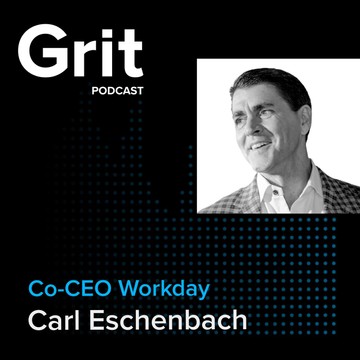
40 snips
Jul 31, 2023 • 1h 22min
#149 Co-CEO Workday, Carl Eschenbach: A Life of Significance
Guest: Carl Eschenbach, co-CEO of WorkdayWhen Carl Eschenbach decided to leave VMWare after more than 14 years as COO, no one believed it: Not chairman Joe Tucci, not CEO Pat Gelsinger, and maybe not Carl himself. But he needed a more predictable work-life balance to help raise his teenage children. For the next seven years, he served as a partner at Sequoia Capital. And every day, he thought — and to his wife’s chagrin, talked — about going back: “It was always on the back of my mind,” he says. After the kids were out of the house, in late 2022, he jumped back into operating and became co-CEO of Workday. “It’s what I love to do,” he says. “I feel like I’ve been called to do it.”In this episode, Carl and Joubin discuss jumping rope, Mike Clayville, the Flowbee, focusing on the family, wrestling, commuting cross-country, servant leadership, Sequoia Capital, Aneel Bhusri, co-CEOs, and Palo Alto Networks.In this episode, we cover:Working on Sand Hill Road (00:55)Carl’s workout routine (03:15)Staying humble and grounded (08:04)Carl’s family and dinner table conversation (11:41)Drive and ambition (16:08)College vs. trade school (19:53)3Com, Inktomi, and EMC (24:33)Deciding to join VMware (28:02)Virtualizing the data center (31:48)The pressure of an incredible ride (35:54)The infamous CFO story (40:14)Eyeing the CEO job (46:00)Carl’s one “big regret” (47:40)Refocusing after a tragedy (52:05)A left turn into venture (55:37)The “itch” to go back to operating (01:00:17)Joining the Workday board (01:04:37)Building an enduring business (01:07:15)“End[ing] my career in an operating role” (01:09:09)Transitioning out of venture (01:15:56)Who Workday is hiring and what “grit” means to Carl (01:18:01)Links:Connect with CarlLinkedInConnect with JoubinTwitterLinkedInEmail: grit@kleinerperkins.com Learn more about Kleiner PerkinsThis episode was edited by Eric Johnson from LightningPod.fm
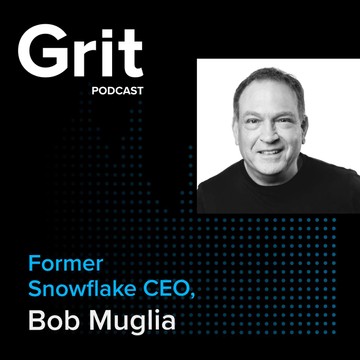
Jul 24, 2023 • 1h 21min
#148 Former Snowflake CEO, Bob Muglia: The Datapreneurs
Guest: Bob Muglia, “The Datapreneurs” Co-Author and Former Snowflake CEOLongtime Microsoft executive and former Snowflake CEO Bob Muglia was done with his book about using data to drive the digital economy — and then ChatGPT came out. “The timeline for artificial intelligence moved in by 50 years in my head,” he recalls. Bob then told his co-author Steve Hamm that they needed to update “The Datapreneurs” to focus more on AI. “For the first time, we have intelligence in a computer,” he says. “English has become the primary programming interface of 2023!”In this episode, Bob and Joubin discuss weekly meetings, Amazon’s values, the tech industry’s Yoda, antitrust lawsuits, the media and Bill Gates, tangling with Andy Jassy, gold rush times, FoundationDB, executive coaches, firing people faster, leaders vs. managers, deepfakes, and the zeroth law of robotics.In this episode, we cover:Bob’s post-Snowflake career (00:57) How he advises startup CEOs (04:12) Getting fired by Steve Ballmer, twice (09:36) Why didn’t he quit? (14:09)Satya Nadella (16:09)Immigrant families and early jobs (17:21)United States v. Microsoft Corp. (21:14)“It may be shit, but it’s compliant shit” (25:26) Antitrust is not about the law (29:18) Rose-colored memories (33:01)Competing with Microsoft and Amazon (34:41)Two years at Juniper (37:45)Transitioning into Snowflake (39:38)Earning credibility (42:32)Chris Degnan, Snowflake’s first sales rep (45:07)Near-death experiences (50:05)Finding traction & taking off (55:33)Surprising challenges (01:00:55)Fired, again (01:02:16)Tough feedback (01:07:01)“The Datapreneurs” and the AI acceleration (01:09:19)Optimism about the future (01:13:36)The Terminator and Isaac Asimov (01:17:48)Links:Connect with BobTwitterLinkedInBuy “The Datapreneurs”Connect with JoubinTwitterLinkedInEmail: grit@kleinerperkins.com Learn more about Kleiner PerkinsThis episode was edited by Eric Johnson from LightningPod.fm
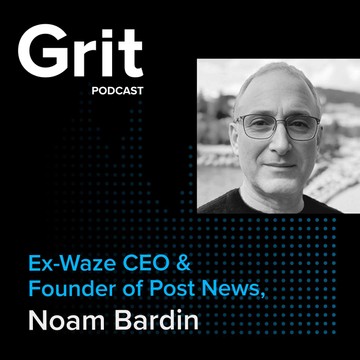
5 snips
Jul 17, 2023 • 1h 30min
#147 Ex-Waze CEO & Founder of Post News, Noam Bardin: Hockey Sticks and Plateaus
Guest: Noam Bardin, founder of Post NewsOne of the “aha” moments that could sway a dubious Waze user, recalls former CEO Noam Bardin, was navigating around “all those idiots sitting in traffic... and you’re like, ‘I’m a genius.’” Now, at the social news app Post, Noam says the “aha” is avoiding partisan gridlock and paywalls. Social incumbents boost engagement by making users angry, while Post just wants you to read. “If we can remove friction and give you the right articles at the right time, so you feel smarter when you walk away,” he says, “that’s the aha moment.”In this episode, Noam and Joubin discuss stories vs. execution, ROFRs, culture clash, timing an acquisition, corporate tags, fear of going bigger, joining big companies, mobile app retention, big tech monopolies, competing against Foursquare, and not optimizing for “culture warriors.”In this episode, we cover:Putting your opinions out there (01:15)Waze almost sold to Facebook (06:10)Getting in the room with Google (13:04)How the first Google deal fell apart (15:10)Back to Facebook — briefly (17:15)The news begins to leak, and Google returns (20:26)Grinding for five years at a startup (23:57)“Hockey sticks” are never smooth (28:32)The personal impact of volatility (31:37)“Everything is a mess in startups” (34:38)The worst day of Noam’s life (38:22)How Waze started, and how Noam joined (42:22)The failure of Intercast Networks (45:07)Brave faces and “corp-speak” (48:33)Integrating into Google’s culture (53:13)No constraints and too much money (01:01:08)Defining metrics that matter (01:04:11)Maps and social (01:06:46)Silicon Valley’s worst invention: “Pivoting” (01:09:56)The social news problem Post solves (01:14:51)Misinformation and authoritarianism (01:18:42)Post’s microtransactions (01:21:08)Being misunderstood and the “aha” moment (01:23:58)Who Post is hiring and what “grit” means to Noam (01:27:09)Links:Connect with NoamTwitterPostLinkedInConnect with JoubinTwitterLinkedInEmail: grit@kleinerperkins.com Learn more about Kleiner PerkinsThis episode was edited by Eric Johnson from LightningPod.fm
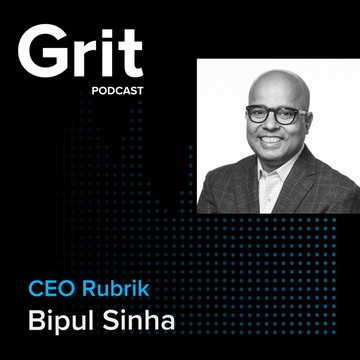
21 snips
Jul 10, 2023 • 1h 10min
#146 Co-founder & CEO Rubrik, Bipul Sinha: Authenticity Reigns
Guest: Bipul Sinha, co-founder and CEO of RubrikWhen Bipul Sinha graduated from the Indian Insitute of Technology and came to America to work in tech, his mother told him: Don’t start a company. His ambitious father was a failed pharma entrepreneur, and Bipul was content for most of a decade to hold a steady job at Oracle. But in his early 30s, he began to shed his risk aversion, pursuing a part-time MBA and more difficult jobs, and by the time he co-founded the data security firm Rubrik in 2014, he had gone through an epiphany: “Only make decisions that you truly believe is the right thing to do,” he says. “If you are here, at the moment of truth, you want to succeed or lose based on your own terms, not what others feel.”In this episode, Bipul and Joubin discuss how debate moves business forward, companies as living systems, growing up poor, refusing to compromise, risk aversion, finding your own potential, paying tuition, context matters, psychological safety, and smelling the roses.In this episode, we cover:Joubin’s interview with Ali Ghodsi (00:51)The importance of authenticity (02:33)Extreme voices (05:10)Being yourself at work (08:14)Reducing blind spots (11:08)Tough feedback (13:09)Learning entrepreneurship through osmosis (14:41)IIT or bust (19:40)Setbacks and reorienting (23:35)Leaving India for America (26:53)From Oracle to Blumberg Capital (30:21)Prioritizing his own happiness (34:36)“This is a career” (37:08)Dissatisfaction and the next thing (40:37)Creating an enduring institution (45:02)No one knows what they’re doing (49:32)Open board meetings (53:39)Hiring and firing (55:37)Good and bad startup advice (57:58)Working forever (01:01:16)Positive feedback and empathy (01:04:19)Who Rubrik is hiring and what “grit” means to Bipul (01:08:55)Links:Connect with BipulTwitterLinkedInConnect with JoubinTwitterLinkedInEmail: grit@kleinerperkins.com Learn more about Kleiner PerkinsThis episode was edited by Eric Johnson from LightningPod.fm
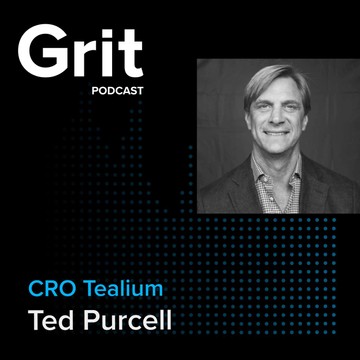
4 snips
Jul 3, 2023 • 1h 8min
#145 CRO Tealium, Ted Purcell: Snap Into It
Guest: Ted Purcell, CRO of TealiumThe biggest difference between small companies and big companies, says Tealium CRO Ted Purcell, is that at untested early-stage firms, you have to convince workers “to truly believe in what they believe... It’s not just ‘do this’ or ‘do that.’” To unlock high performers, Ted explains, you need to give them a “religious level” of belief in the company and the value it delivers to customers, which will carry over into every aspect of their jobs. And this is even more important in a market downturn: “That becomes the main job because the winning is not as evenly spread,” he says. In this episode, Ted and Joubin discuss empty-nesters, resisting leadership, liking to win vs. hating to lose, complete commitment, commitment to culture, hardcore accountability, Israeli conversations, Day-Timers, and endurance battles.In this episode, we cover:Growing up and raising kids in Silicon Valley (00:56)From individual contributor to management (05:03)The appreciation for the grind (08:45)Ted’s father and his sudden passing (10:33)Stepping up to take care of the family (14:40)The Purcell family dinner table conversation (18:22)Working with Bill McDermott at SAP (20:50)Ted’s favorite Bill story (26:00)Getting comfortable as a leader (28:35)(Over-) Optimizing for lifestyle (34:02)How to spot greatness in interviews (37:25)A startup guy at big companies (39:48)Clarizen and corporate culture in Israel (42:10)Tealium and the “pressure cooker” environment (47:36)Believing in the “why” (51:13)Tough feedback and misconceptions (53:47)Recording ideas and daily habits (55:33)Pushing to achieve your potential (57:38)Gaining perspective (01:02:05)Who Tealium is hiring and what “grit” means to Ted (01:05:55)Links:Connect with TedLinkedInConnect with JoubinTwitterLinkedInEmail: grit@kleinerperkins.com Learn more about Kleiner PerkinsThis episode was edited by Eric Johnson from LightningPod.fm
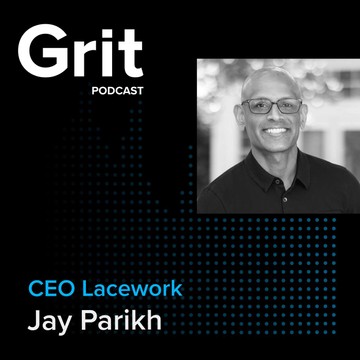
7 snips
Jun 26, 2023 • 1h 11min
#144 CEO Lacework, Jay Parikh: Quiet Intensity
Guest: Jay Parikh, CEO of LaceworkJay Parikh describes himself as a “stickler” for meetings that start and end on time, and holds himself to the same expectations as his workers. “It’s just really important as a leader to set the standard for how everybody else should be respected,” the Lacework CEO says. “Too often in our industry, executives think that they can show up late, hold a meeting late, and everybody will adjust.” No one will complain, he says, to the person on top of the org chart when they are 10 minutes late, but they should: “I’m like, no, I disrespected 10 minutes of your time. So I take that really seriously.”In this episode, Jay and Joubin discuss non-traditional CEOs, surviving Facebook’s early days, disrupting yourself, Akamai co-founder Danny Lewin, cultivating culture, applying restless energy, the loneliness of leaders, brushing your teeth, the love of the game, and being approachable.In this episode, we cover:The “S-curve of learning” (01:04)Finding new challenges (05:10)“Is this too big of a job?” (07:33)Intensity and zen (11:00)Jay’s first jobs (15:07)Akamai’s post-IPO pop and crash (16:31)9/11 and Danny Lewin’s legacy (19:56)Facebook’s pivot to mobile (24:58)Managing morale when the share price drops (27:16)Learning from Mark Zuckerberg (30:13)Being on time (34:44)Security in the cloud (37:58)Leaving Facebook (40:01)What has surprised Jay about becoming a CEO (45:00)Hiring, onboarding, and unlocking people (49:34)Jay’s favorite interview questions (54:34)Refusing to compromise on greatness (01:00:44)Balancing work and family (01:07:02)Who Lacework is hiring and what “grit” means to Jay (01:09:06)Links:Connect with JayTwitterLinkedInConnect with JoubinTwitterLinkedInEmail: grit@kleinerperkins.com Learn more about Kleiner PerkinsThis episode was edited by Eric Johnson from LightningPod.fm


